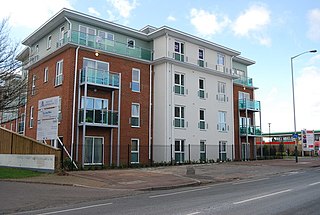
Age Concern is the banner title used by several charitable organizations (NGOs) specifically concerned with the needs and interests of all older people based chiefly in the four countries of the United Kingdom.

In Ireland and the United Kingdom, housing associations are private, non-profit organisations that provide low-cost "social housing" for people in need of a home. Any budget surplus is used to maintain existing housing and to help finance new homes and it cannot be used for personal benefit of directors or shareholders. Although independent, they are regulated by the state and commonly receive public funding. They are now the United Kingdom's major providers of new housing for rent, while many also run shared ownership schemes to help those who cannot afford to buy a home outright.

The Diana, Princess of Wales Memorial Fund was an independent grant-giving foundation established in September 1997 after the death of Diana, Princess of Wales, to continue her humanitarian work in the United Kingdom and overseas. It was a registered charity under English law. The Fund closed at the end of 2012.

Trustee is a legal term which, in its broadest sense, is a synonym for anyone in a position of trust and so can refer to any individual who holds property, authority, or a position of trust or responsibility for the benefit of another. A trustee can also be a person who is allowed to do certain tasks but not able to gain income. Although in the strictest sense of the term a trustee is the holder of property on behalf of a beneficiary, the more expansive sense encompasses persons who serve, for example, on the board of trustees of an institution that operates for a charity, for the benefit of the general public, or a person in the local government.

Millennium Point is a multi-use meeting and conference venue, public building and charitable trust in Birmingham, England, situated in the developing Eastside of the city centre. The complex contains multiple event spaces, including a 354-seat auditorium, formerly Giant Screen IMAX cinema; Birmingham Science Museum, Royal Birmingham Conservatoire's School of Acting and Birmingham City University's Faculty of Computing, Engineering and The Built Environment, part of Birmingham Metropolitan College.

The Welsh Centre for International Affairs (WCIA) is a Welsh international affairs and strategy think tank, established in 1973 to promote the exchange of ideas on international issues, build international partnerships connecting Welsh people and organisations with the world, and encourage global action in communities and organisations across Wales. It is based in the Temple of Peace in Cardiff.

The Millennium Stadium, known since 2016 as the Principality Stadium for sponsorship reasons, is the national stadium of Wales. Located in Cardiff, it is the home of the Wales national rugby union team and has also held Wales national football team games. Initially built to host the 1999 Rugby World Cup and replacing the National Stadium, it has gone on to host many other large-scale events, such as the Tsunami Relief Cardiff concert, the Super Special Stage of Wales Rally Great Britain, the Speedway Grand Prix of Great Britain and various concerts. It also hosted FA Cup, League Cup and Football League play-off finals while Wembley Stadium was being redeveloped between 2001 and 2006, as well as football matches during the 2012 Summer Olympics.

A charitable organization or charity is an organization whose primary objectives are philanthropy and social well-being.

The National Lottery Community Fund, legally named the Big Lottery Fund, is a non-departmental public body responsible for distributing funds raised by the National Lottery for "good causes".
A social enterprise is an organization that applies commercial strategies to maximize improvements in financial, social and environmental well-being. This may include maximizing social impact alongside profits for co-owners.

The National Council for Voluntary Organisations (NCVO) is the umbrella body for the voluntary and community sector in England. It is a registered charity. It works to support the voluntary and community sector and to create an environment in which an independent civil society can flourish. NCVO has a membership of more than 17,000 voluntary organisations. These range from large national bodies to community groups, volunteer centres, and development agencies working at a local level. In 2023, its income was £7.1 million.

Literature Wales, formerly named the Academi, is the Welsh national literature promotion agency and society of writers, existing to promote Welsh-language and English-language literature in Wales. It offers bursaries for writing projects, runs literary events and lectures, and provides financial assistance for creative mentoring and other literary-based ventures. The organisation also selects the National Poet for Wales, and manages competitions including Wales Book of the Year, the Cardiff International Poetry Competition, and the Rhys Davies Short Story Competition.

Emergency medical services in the United Kingdom provide emergency care to people with acute illness or injury and are predominantly provided free at the point of use by the four National Health Services (NHS) of England, Scotland, Wales, and Northern Ireland. Emergency care including ambulance and emergency department treatment is only free to UK residents and a charge may be made to those not entitled to free NHS care.
The National Literacy Trust is an independent charity based in London, England, that promotes literacy.
Fish Legal, based at Leominster, Herefordshire, is a not-for-profit organisation of dedicated lawyers who use the law on behalf of anglers to fight polluters and others who damage or threaten the water environment. It was founded in 1948 by Patrick Shumack, Esq. as the Anglers Cooperative Association (ACA), but changed its name in 1994 to Anglers Conservation Association.
An exempt charity is an institution established in England and Wales for charitable purposes which is exempt from registration with, and oversight by, the Charity Commission for England and Wales.
The Welsh Archaeological Trusts were the four archaeological organisations covering Wales, from their establishment in the mid-1970s until their merger into a single archaelogical organisation, Heneb, in 2024.

The Clwyd-Powys Archaeological Trust was an educational charity, the objective of which was ‘to advance the education of the public in archaeology’. CPAT was established in 1975 and dissolved in 2024, when it merged with the three other Welsh Archaeological Trusts (WATs) to create Heneb: the Trust for Welsh Archaeology.
Sir Rodney Myerscough Walker is a British entrepreneur and philanthropist and the current Chairman of the British Basketball League.

A charitable incorporated organisation (CIO) is a corporate form of business designed for charitable organisations in England and Wales. A similar form, with minor differences, exists for Scottish charities.














